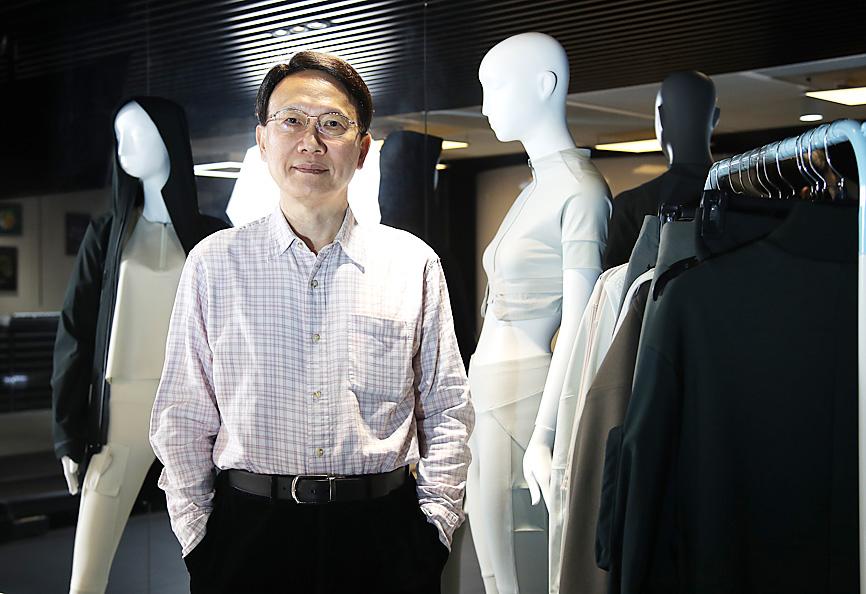Makalot Industrial Co’s (聚陽) outlook remains positive thanks to strong sportswear demand after the US and EU lifted COVID-19 restrictions, even though the company’s shipments in the first half of the year were affected by container shortages, Yuanta Securities Investment Consulting Co (元大投顧) said on Thursday.
With clear order visibility from its major clients and previous quarter shipments delayed due to container shortages, revenue might grow 14.9 percent year-on-year this quarter to NT$9.2 billion (US$328.5 million) and increase 18 percent to NT$7.1 billion next quarter, pushing this year’s revenue growth 17.5 percent to NT$29.2 billion, Yuanta said in a note.
Yuanta is keeping its shipment growth estimate of 18 percent this year and forecasts an increase in average selling prices of 5 percent for the manufacturer of ready-to-wear apparel and functional clothing this year, it said.

Photo: CNA.
Makalot’s revenue contribution from sportswear and leisurewear would increase from 25 percent last year to 40 percent this year, lifting its operating margin by 47 percentage points to 12.3 percent, Yuanta said.
The firm counts GAP Inc, Fast Retailing Co’s GU sub-brand, Kohl’s Corp, Target Corp, Walmart Inc and Hanesbrands Inc among its major clients, it said.
Makalot on Wednesday posted pre-tax profit of NT$332.13 million for last month, up 10.2 percent from a year earlier, and pre-tax profit for the first half of the year of NT$1.54 billion, an annual increase of 41.91 percent.
Pre-tax earnings per share were NT$6.63, based on the company’s 232 million outstanding shares, the manufacturer said in a filing with the Taiwan Stock Exchange.
Revenue in the first six months increased 19.17 percent year-on-year to NT$12.94 billion, the filing said.
Makalot shares closed up 0.61 percent at NT$247 on Friday.
They have dropped 3.7 percent in the past month, compared with the broader market’s 4.88 percent rise over the same period, as investors were worried about supply chain risks due to a resurgence of COVID-19 in Indonesia and Vietnam.
Another garment and fabric supplier, Eclat Textile Co (儒鴻), last week suspended production at one of its plants in Vietnam for three days after workers at the facility were found to have COVID-19.
Makalot’s plants in Vietnam, Indonesia and Cambodia contribute 40 percent, 34 percent and 20 percent respectively to its total capacity, Yuanta said.
While the company has so far not reported any production issues at its plans in ASEAN countries, unpredictable circumstances, such as the pandemic situation in the region and the container shortage, need to be monitored, it said.

To many, Tatu City on the outskirts of Nairobi looks like a success. The first city entirely built by a private company to be operational in east Africa, with about 25,000 people living and working there, it accounts for about two-thirds of all foreign investment in Kenya. Its low-tax status has attracted more than 100 businesses including Heineken, coffee brand Dormans, and the biggest call-center and cold-chain transport firms in the region. However, to some local politicians, Tatu City has looked more like a target for extortion. A parade of governors have demanded land worth millions of dollars in exchange

Hong Kong authorities ramped up sales of the local dollar as the greenback’s slide threatened the foreign-exchange peg. The Hong Kong Monetary Authority (HKMA) sold a record HK$60.5 billion (US$7.8 billion) of the city’s currency, according to an alert sent on its Bloomberg page yesterday in Asia, after it tested the upper end of its trading band. That added to the HK$56.1 billion of sales versus the greenback since Friday. The rapid intervention signals efforts from the city’s authorities to limit the local currency’s moves within its HK$7.75 to HK$7.85 per US dollar trading band. Heavy sales of the local dollar by

Taiwan Semiconductor Manufacturing Co’s (TSMC, 台積電) revenue jumped 48 percent last month, underscoring how electronics firms scrambled to acquire essential components before global tariffs took effect. The main chipmaker for Apple Inc and Nvidia Corp reported monthly sales of NT$349.6 billion (US$11.6 billion). That compares with the average analysts’ estimate for a 38 percent rise in second-quarter revenue. US President Donald Trump’s trade war is prompting economists to retool GDP forecasts worldwide, casting doubt over the outlook for everything from iPhone demand to computing and datacenter construction. However, TSMC — a barometer for global tech spending given its central role in the

The Financial Supervisory Commission (FSC) yesterday met with some of the nation’s largest insurance companies as a skyrocketing New Taiwan dollar piles pressure on their hundreds of billions of dollars in US bond investments. The commission has asked some life insurance firms, among the biggest Asian holders of US debt, to discuss how the rapidly strengthening NT dollar has impacted their operations, people familiar with the matter said. The meeting took place as the NT dollar jumped as much as 5 percent yesterday, its biggest intraday gain in more than three decades. The local currency surged as exporters rushed to